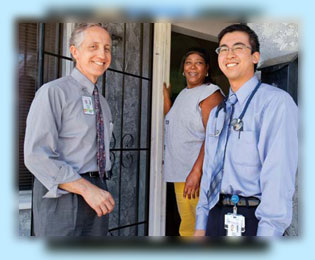In addition to each resident’s continuity practice in the Family Medicine Center, certain elements of medical education lend themselves more to a longitudinal format rather than a block experience. Among the experiences taught in a longitudinal manner are:

Family Planning: We provide full-spectrum family planning within our family medicine clinic, and our residents receive comprehensive training on contraception counseling and become very comfortable with LARCs. We have started offering medication abortion (Mifeprex) in our clinic, which increases access for our patients to safe termination of pregnancy. In addition, we were recently awarded the RHEDI Grant, which gives our program the opportunity to offer opt-out abortion training and will begin offering manual vacuum aspirations in our clinic. As part of our intern year gynecology rotation, we also include opt-out high volume abortion training at a local Planned Parenthood.
House Calls Service: A part of training here since 1983, the House Calls Service involves one resident at a time going out on home visits with one of the full-time faculty, both to provide in-home assessments of the resident’s own patients and to provide ongoing care for a panel of home-bound patients in the community.
Point of Care Ultrasound: Beginning with our maternity care curriculum, and expanding with the start of our sports medicine fellowship in 2014, we have been steadily increasing our use of ultrasound in the outpatient setting. We have now developed a comprehensive POC ultrasound curriculum to ensure that our residents will be adept in bedside ultrasound including AAA screening, DVT evaluation, abdominal ultrasound, soft tissue ultrasound and ultrasound guided paracentesis.
LGBTQ Medicine: Long Beach has a large LGBTQ population, and we are privileged to be able to serve this vulnerable demographic. All residents will get ample longitudinal education in gender-affirming care, HIV prevention (through pre-exposure prophylaxis), and training in culturally-sensitive care of LGBTQ patients. All residents will spend time with Dr. Castillo in the LGBTQ Clinic during their third year.
Group Visits: Since 2006 we have been holding monthly group visits for patients with diabetes in our practice. This has been an opportunity to develop one element of the future of family medicine and demonstrate how our patients can learn from and teach one another. These visits are multidisciplinary, with participation from residents, students, nursing staff, social work, and behavioral and medical faculty.
Wellness: The wellness of our residents, faculty and staff are a priority in this residency. We have a wellness curriculum that has been developed by the residents. It involves monthly wellness activities, snacks for the resident room, workshops on compassion and emotional intelligence, monthly Balint groups, formal debriefing sessions, quarterly resident/faculty get-togethers and monthly resident social activities. This curriculum is being expanded so will have new components in the upcoming year.
Behavioral Medicine: We have started a weekly behavioral medicine clinic in our FM office. The clinic is staffed by a psychiatrists, a faculty family medicine physician, a faculty psychologist, therapist and social worker. The goal is to provide better access to mental health services to our patients and an excellent behavioral medicine curriculum for our residents.